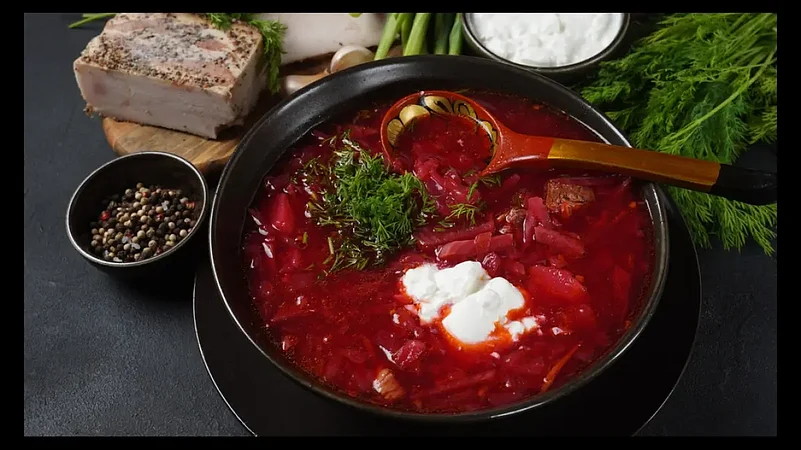If you are fond of exotic soups, there are chances you may have enjoyed a bowl of borscht (also spelled borsch, borsht, or bortsch) in India. Restaurants in urban settings from Dehra Dun to Mumbai are known to serve this essentially sour beet soup in both versions – hot and cold. Indian food blogs too talk of this soup. Yet little did we know that this soup was on the verge of losing its unique identity owing to the ongoing war between Russia and Ukraine until the UNESCO inscribed the Culture of Ukrainian borscht cooking on the List of Intangible Cultural Heritage in Need of Urgent Safeguarding early this month.
If media reports are to be believed, the friction between Ukraine and Russia came to light back in 2019, when the official Twitter handle of the Russian Federation’s Ministry of Foreign Affairs said – ‘A timeless classic! #Borsch is one of Russia's most famous & beloved #dishes & a symbol of traditional cuisine’ followed with a series of emoticons, and a line on the origin on the name of the dish.’
However, the international body fast tracked the nomination (originally scheduled for consideration in the 2023 cycle) as a case of extreme urgency, in accordance with the rules and procedures of the Convention, to ensure that the ongoing war did not leave a negative impact on the tradition. According to media reports, the approval came on the basis of an application by Ukraine’s celebrity chef, 35 year old Yevhen Klopotenko, who, concerned over Russia's claim, had travelled across the country to document how borscht is an integral part of Ukrainian culture.
The main aim of UNESCO’s List of Intangible Cultural Heritage in Need of Urgent Safeguarding is to mobilise attention ‘to safeguard intangible cultural heritage whose viability is at risk despite the best efforts of the community or the State party’. Ukrainian borscht - national version of borscht consumed in several countries of the region - is an integral part of Ukrainian family and community life. Festivals and cultural events are dedicated to it, according to the UNESCO official release.
‘Whether as part of a wedding meal, the focus of food-related competitions or as a driver of tourism, borscht is considered part of the fabric of Ukrainian society, cultural heritage, identity and tradition,’ the cultural agency said. The ongoing armed conflict has resulted in displacement of people who are unable not only to cook or grow local vegetables for borscht, but also to come together to practice the element, thus threatening its viability, it said.
Although the origin of borscht has been a matter of debate, according to the release, the culture of borscht cooking has long been practiced in all regions of Ukraine. Encyclopaedia Britannica too acknowledges that though borscht is important in Russian and Polish cuisines, Ukraine is frequently cited as its place of origin. Ukraine too treats it as its national dish.
However, according to media reports, Russia has denounced the recognition granted to Ukrainian Borscht. Others have pointed out that countries such as Romania, Poland, Moldova, and Lithuania also have their own versions of borscht. While the beetroot based red coloured borscht from Ukraine is most popular, there are also other variations, according to culinary experts, such as the sorrel based green borscht or the rye based white borscht.
It is said that borscht originated long back when it used to be prepared by the Slavs using different parts of the herbaceous Common Hogweed (Heracleum sphondylium), which probably led to the Slavic name, according to the book Food and Drink in Medieval Poland: Rediscovering a Cuisine of the Past [Dembińska, Maria (1999). Weaver, William Woys (ed.)].
Gradually, it evolved into a range of tart soups. Simply speaking, the Ukrainian beet-based red borscht includes meat or bone stock with sautéed vegetables, such as cabbage, carrots, onions, potatoes, etc. The sour taste comes from the fermented beet used in the soup. Borscht may be prepared as a vegetarian dish too. Depending on the situation, it can range from a clear broth to a one-pot meal.
Communities, families and restaurants have developed their own versions of this traditional dish, with added products depending on the regional availability of ingredients, including mushrooms, fish or sweet peppers. According to an Indian motoring guide website, one of their members found tomatoes and apples bunged in too at a restaurant in Dehra Dun.
However, the UNESCO release did mention that ‘Borscht cooking is also practiced in communities in the broader region, and whilst the inscription recognizes the social and cultural importance of Borscht cooking amongst Ukrainians, an inscription of an element of intangible cultural heritage on a list of the UNESCO 2003 Convention for the safeguarding of the intangible cultural heritage does not imply exclusivity, nor ownership, of the heritage concerned’.





















